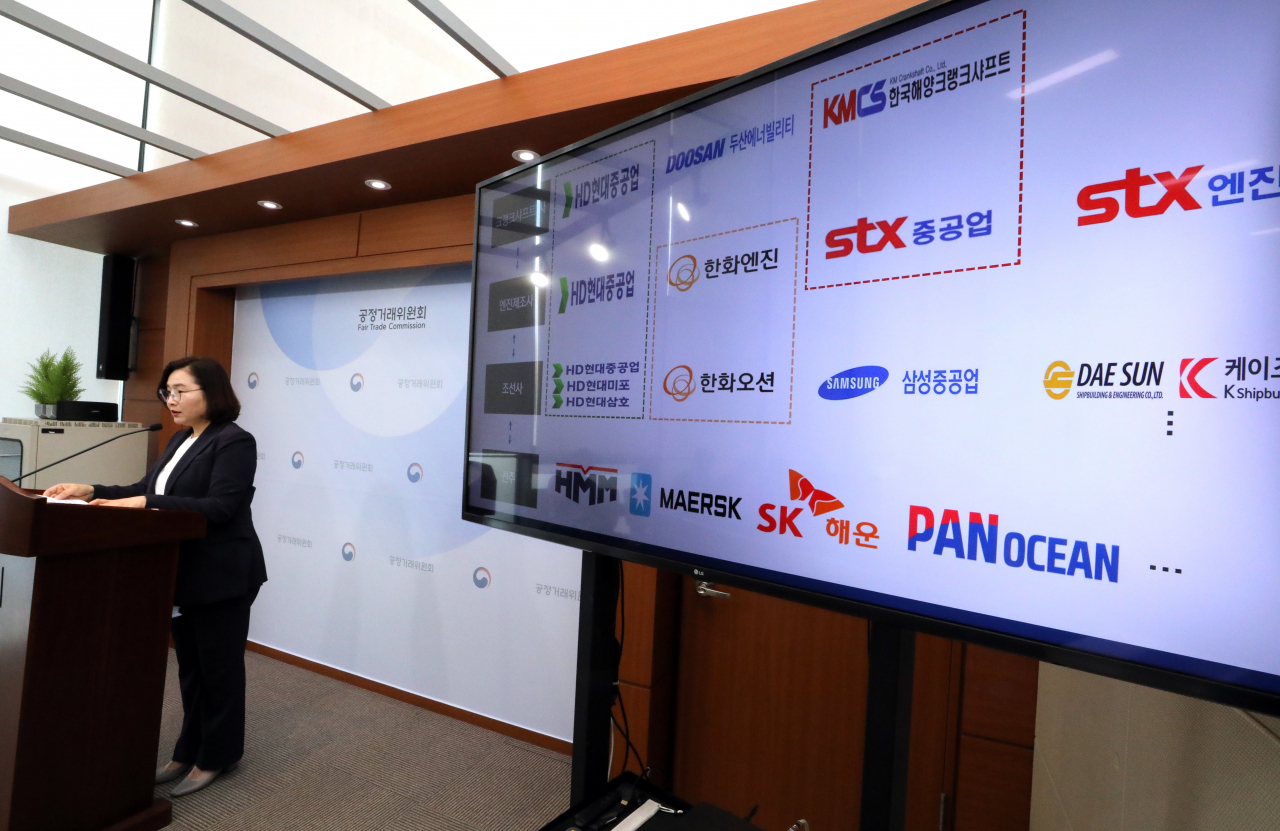 |
Jeong Hee-eun, head of the merger review division at the Korea Fair Trade Commission, announces Monday at the Government Complex Sejong that the commission conditionally approved HD Korea Shipbuilding & Marine Engineering's acquisition of a 35 percent stake in STX Heavy Industries. (Yonhap) |
The Korea Fair Trade Commission has approved HD Korea Shipbuilding & Offshore Engineering's acquisition of STX Heavy Industries, subject to conditions that prevent supply refusal and price increases for marine engine parts for three years to ensure fair competition.
The merger of HD Korea Shipbuilding & Offshore Engineering, the leader in the marine engine and components market, with STX Heavy Industries, the third-largest player in the same sector, is set to significantly enhance HD Korea Shipbuilding’s competitive edge against its primary rivals, Hanwha Ocean and Hanwha Engine.
The commission's decision, announced Monday, aims to mitigate potential competition restrictions in the domestic marine engine market resulting from the merger. HD Korea Shipbuilding, an intermediate holding company of HD Hyundai, will acquire 35.05 percent of STX Heavy Industries. This acquisition includes STX Heavy Industries' subsidiary, KM Crank Shaft, which produces crucial marine engine parts like crankshafts.
The commission investigated the merger's impact on various market segments, focusing on potential competition restrictions due to vertical and horizontal tie-ups between crankshafts, marine engines and ships.
One significant concern regarding the merger was that the combined company might refuse to supply crankshafts to competitors like Hanwha Engine and STX Engine, jeopardizing their production. Historically, domestic engine manufacturers either produced their crankshafts or had exclusive arrangements with suppliers. Hanwha Engine, formerly HSD Engine, sourced crankshafts from Doosan Enerbility and KM Crank Shaft, but the merger threatens the stability of this supply chain.
The merger raises concerns that KM Crank Shaft, now part of the HD Hyundai group, may refuse to supply crankshafts to Hanwha Engine or offer them at unfavorable prices or with delayed delivery times, disrupting Hanwha's engine production. This disruption would likely shift demand to HD Hyundai, further strengthening its market position.
Compounding this issue, Hanwha's main supplier, Doosan Enerbility, is operating at full capacity due to increased orders for nuclear power plant components, limiting its ability to produce additional crankshafts. Additionally, Chinese-made crankshafts are not a viable alternative due to quality, transportation costs and delivery reliability.
Hanwha recently expanded its presence in the shipbuilding industry by acquiring Daewoo Shipbuilding & Marine Engineering, now known as Hanwha Ocean, and Hanwha Engine. These acquisitions aimed to vertically integrate its marine engine manufacturing business, positioning Hanwha as a strong competitor to HD Hyundai in the shipbuilding and marine engine markets. However, the commission recognized that Hanwha's dependence on external suppliers for crankshafts, which it has not yet vertically integrated, could undermine fair competition in the market.
To address these issues, the commission has imposed safeguards to ensure a stable crankshaft supply for competing engine manufacturers for three years. These measures include prohibiting supply refusal, ensuring minimum supply quantities, capping price increases and preventing delivery delays. The safeguard period may be extended based on future market conditions.
The commission emphasized that these measures balance the merger's intent to enhance competitiveness in the global engine market, especially for eco-friendly engines, with the need to maintain fair competition in Korea's shipbuilding industry.
"This decision is significant in ensuring fair competition in a key national industry," said an official from the commission.
"We're fully on board with the KFTC's decision and are excited to harness the combined strengths of both companies. This merger is a great opportunity to drive innovation in the eco-friendly engine sector," said an official from HD Korea Shipbuilding & Marine Engineering.







![[Today’s K-pop] Blackpink’s Jennie, Lisa invited to Coachella as solo acts](http://res.heraldm.com/phpwas/restmb_idxmake.php?idx=644&simg=/content/image/2024/11/21/20241121050099_0.jpg)